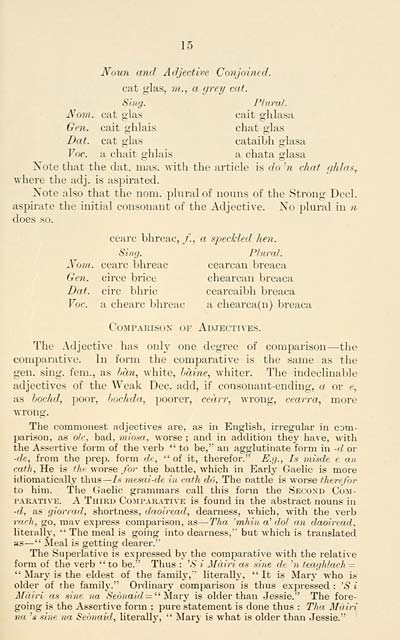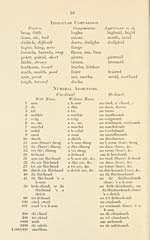Download files
Complete book:
Individual page:
Thumbnail gallery: Grid view | List view

15
Noun and Adjective Conjoined.
cat glas, VI., a grey cat.
Sing. Plural.
Nom. cat glas cait ghlasa
Gen. cait ghlais chat glas
Dat. cat glas cataibh glasa
Voc. a chait ghlais a chata glasa
Note that the dat. mas. witli the article is do 'n chat ghlaSf
where the adj. is aspirated.
Note also that the nom. phiral of nouns of the Strong Decl.
aspirate the initial consonant of the Adjective. No plural in n
does so.
cearc bhreac, /., a qjeckled hen.
Simj. Plural.
Xoin. cearc bhreac cearcan breaca
Gen. circe bi'ice chearcan breaca
Dat. circ bhric cearcaibh breaca
Voc. a chearc bhreac a chearca(n) breaca
Comparison of Adjectives.
The Adjective has only one degree of comparison — tlie
comparative. In form the comparative is the same as the
gen. sing, fern., as hàn, white, hàine, whiter. The indeclinable
adjectives of the Weak Dec. add, if consonant-ending, a or e,
as hochd, poor, /lochda, poorer, ceàrr, wrong, cearra, more
wrong.
The commonest adjectives ai'e, as in English, irregular in com-
parison, as oil', bad, miosa, worse ; and in addition they have, with
the Assertive form of the verb " to be," an agglutinate form in -(/ or
-de, from the prep, form dt, " of it, therefor." E.<i., Is misde e an
cath, He is fix worse /or the battle, which in Early Gaelic is more
idiomatically thus — /v mesai-de in rath dn. The nattle is worse therefor
to him. The Gaelic grammars call this form the Second Com-
parative. A Third Comparative is found in the abstract nouns in
-d, as giorrad, shortness, daoiread, dearness, which, with the verb
rach, go, mav express compai'ison, as — Tha 'mhiii a' dol an daoiread,
literally, " The meal is going into dearness," but which is translated
as — " Meal is getting dearer."
The Superlative is expressed by the compai-ative with the relative
form of the verb " to be." Thus : '.S' i Màiri as sine de 'n teayhlach =
" Mary is the eldest of the familj-,"' literally, " It is Mary who is
older of the family." Ordinary comparison is thus expressed : 'S i
Mùiri as sine na Seanaid —" Hilary is older than Jessie." The fore-
going is the Assertive form : pure statement is done thus : Tha Mùiri
va 's sine na Seònaid, literally, " Mary is what is older than Jessie."
Noun and Adjective Conjoined.
cat glas, VI., a grey cat.
Sing. Plural.
Nom. cat glas cait ghlasa
Gen. cait ghlais chat glas
Dat. cat glas cataibh glasa
Voc. a chait ghlais a chata glasa
Note that the dat. mas. witli the article is do 'n chat ghlaSf
where the adj. is aspirated.
Note also that the nom. phiral of nouns of the Strong Decl.
aspirate the initial consonant of the Adjective. No plural in n
does so.
cearc bhreac, /., a qjeckled hen.
Simj. Plural.
Xoin. cearc bhreac cearcan breaca
Gen. circe bi'ice chearcan breaca
Dat. circ bhric cearcaibh breaca
Voc. a chearc bhreac a chearca(n) breaca
Comparison of Adjectives.
The Adjective has only one degree of comparison — tlie
comparative. In form the comparative is the same as the
gen. sing, fern., as hàn, white, hàine, whiter. The indeclinable
adjectives of the Weak Dec. add, if consonant-ending, a or e,
as hochd, poor, /lochda, poorer, ceàrr, wrong, cearra, more
wrong.
The commonest adjectives ai'e, as in English, irregular in com-
parison, as oil', bad, miosa, worse ; and in addition they have, with
the Assertive form of the verb " to be," an agglutinate form in -(/ or
-de, from the prep, form dt, " of it, therefor." E.<i., Is misde e an
cath, He is fix worse /or the battle, which in Early Gaelic is more
idiomatically thus — /v mesai-de in rath dn. The nattle is worse therefor
to him. The Gaelic grammars call this form the Second Com-
parative. A Third Comparative is found in the abstract nouns in
-d, as giorrad, shortness, daoiread, dearness, which, with the verb
rach, go, mav express compai'ison, as — Tha 'mhiii a' dol an daoiread,
literally, " The meal is going into dearness," but which is translated
as — " Meal is getting dearer."
The Superlative is expressed by the compai-ative with the relative
form of the verb " to be." Thus : '.S' i Màiri as sine de 'n teayhlach =
" Mary is the eldest of the familj-,"' literally, " It is Mary who is
older of the family." Ordinary comparison is thus expressed : 'S i
Mùiri as sine na Seanaid —" Hilary is older than Jessie." The fore-
going is the Assertive form : pure statement is done thus : Tha Mùiri
va 's sine na Seònaid, literally, " Mary is what is older than Jessie."
Set display mode to: Large image | Transcription
Images and transcriptions on this page, including medium image downloads, may be used under the Creative Commons Attribution 4.0 International Licence unless otherwise stated. ![]()
| Early Gaelic Book Collections > Blair Collection > How to learn Gaelic > (25) |
|---|
| Permanent URL | https://digital.nls.uk/79789354 |
|---|
| Description | A selection of books from a collection of more than 500 titles, mostly on religious and literary topics. Also includes some material dealing with other Celtic languages and societies. Collection created towards the end of the 19th century by Lady Evelyn Stewart Murray. |
|---|
| Description | Selected items from five 'Special and Named Printed Collections'. Includes books in Gaelic and other Celtic languages, works about the Gaels, their languages, literature, culture and history. |
|---|

